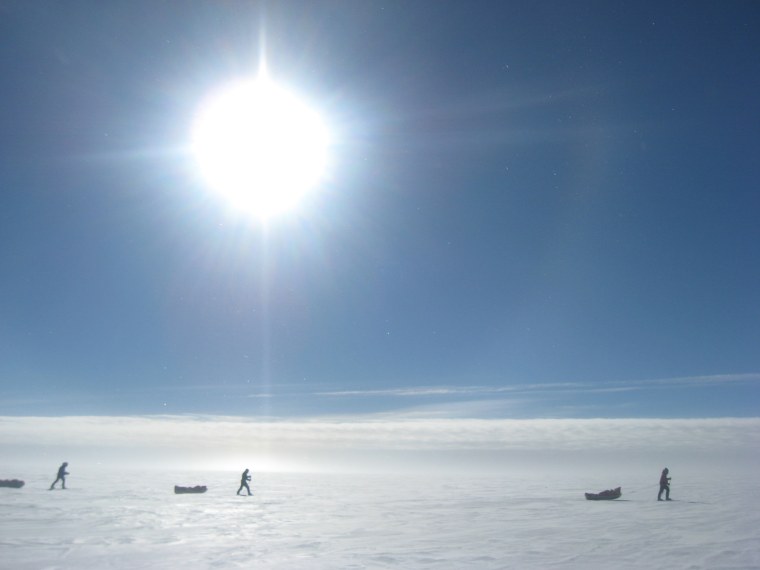So here's the challenge: be the first person to ever trek to the South Pole, North Pole and top of Mount Everest in one year. It's not so much the "first-ever" label that Eric Larsen is after, but attention for his favorite cause: saving the ice.
Satellite and on-the-ground measurements show that the Arctic is quickly losing its sea ice in the summer, while some parts of Antarctica, particularly the Antarctic Peninsula, are melting fast.
As an ice addict, Larsen, 38, already has first-hand experience at both ends of the Earth. He completed a 41-day South Pole trek last January, and a North Pole trip in 2006. The latter was particularly hazardous due to shifting sea ice.
The Wisconsin native who now lives in Minnesota on Friday arrived at Patriot Hills, an ice field on the Antarctic Peninsula. From there it's about 700 miles to the South Pole.
Msnbc.com will be tracking Larsen, as well as linking to his Twitter posts, during his treks. The South Pole leg is expected to take two months. He and two partners are relying on freeze-dried meals that can deliver 6,000 to 8,000 calories a day — and hoping not to run into huge snow drifts, crevasses or -50 degree wind chills.
Larsen and his team will also be discussing the treks and climate change at ericlarsenexplore.newsvine.com.
Before leaving for Chile, Larsen explained his vision, values and what he expects during two months of extreme cold on Antarctica.
Do you call yourself an explorer, an adventurer or do you have another name for what you do?
I still call myself an explorer even though most people say that there are no real explorers left, that the world has long been mapped and visited. For the most part that's true. However, I still think exploration has a role in our society. It fosters curiosity and builds a connection to the natural world. In reality, I think we are all explorers discovering the world for ourselves. However, the job of explorers in the 21st century is not to conquer these places but to protect them.
More than anything, I consider myself a storyteller. I am trying to tell the story of the last great frozen places left on the planet: the North Pole, South Pole and Mt. Everest.
Can you do this fulltime and survive financially? Or do you have a 'day' job?
I live a very, very meager life. I support myself through speaking engagements, expedition guiding and odd jobs.
How long have you been out there 'exploring' and how did you get into it?
I've always been fascinated by winter and I love camping. After college, I had a random assortment of outdoor jobs — from a back country ranger in Alaska to guiding white water canoe trips in Colorado to dog sledding in northern Minnesota. I went on what I would call my first "real" expedition in 1995 — a month-long sledding trip north of Great Slave Lake in Canada's Northwest Territories.
What was the first connection you made with the climate and wanting to focus on that?
As someone who loves to be outside, I have a strong connection to the environment and have always been concerned about environmental issues.
In 1991, I was in college and took a class called "Global Climate Change". It was there that I first learned about Earth's climate and how it has changed over time. We also studied the mechanisms of modern climate change, the factors creating a warming planet.
However, as I have traveled around the Arctic for the past 15 years, I have also talked with a lot of people who live in some of these remote outposts and seen changes due to a warming climate first hand: thaws coming earlier, freeze-ups coming later, migration patterns of wildlife changing, unusual and unpredictable weather, etc.
On a purely selfish level, I am someone who loves snow, ice and cold, I am very concerned about global warming and our changing climate. With the Arctic losing almost one-third of its surface ice in the last 20 years, snow, ice and cold is on the same path as the passenger pigeon. Scientists estimate that the Arctic Ocean, will be ice free in the summer in as little as 10 or 20 years!
What's been the most exciting trek or moment on a trek so far?
Anytime you hook up 10 or 12 insanely fast sled dogs up to a tiny sled, you're bound to have an exciting adventure. Ironically, polar expeditions are slow and drawn out ordeals. Most times you are just trying to find ways to cope with all the monotony.
What's been the most dangerous?
My summer expedition to the North Pole in 2006. Open water, thin ice, polar bear encounters. There is nothing about that place that wants humans to be there.
Who's going with you to the South Pole?
Fundraising for the Save the Poles expedition has been difficult in this economy to say the least. I was lucky with the South Pole to get the opportunity to guide a trip for a company called Adventure Network International. My teammates are:

Dr. Bill Hanlon, who completed seven summits in 2007. He is founder and medical director of Basic Health International, a Canadian charity that supports primary health care and public health projects in remote, high need communities living at high altitude. The primary focus of the foundation is to help create sustainable, economically viable, local solutions in the area of public health and primary health care. BHI has been involved in projects in Tibet, Mongolia, Nepal, Ladakh, Ethiopia, Peru, Honduras and West Papua.
Dongsheng Liu, who is a marathon runner, sport biker, snowboarder and outdoor enthusiast. He was born and grew up in China but has lived in Canada since 2002. He runs an adventure company in Canada and the Arctic Circle in winter watching the northern lights. Dongsheng started preparing for polar travel in 2008. He took the polar training in 2009 March with Matty McNair (and myself as an assistant) on Baffin Island.
What do you expect will be the toughest part of the South Pole trek this time?
Wind chills dipping to -50, big snow drifts called Sastrugi, crevasses and the daily grind and wear and tear of spending nearly two months in the extreme cold.
If you need emergency help, how quickly can someone get to you out there? Who's out there to help?
Adventure Network International runs most of the private logistics in Antarctica. Compared to the North Pole, Antarctica is relatively safe. That said, it is still the windiest, coldest and driest place on our planet. So extreme is the weather that should disaster strike, it is realistic to be stuck in an area for up to a week or more before rescue.
Do you have a significant other and/or kids? If so, what do they think about this mission?
I am not married or have kids. I do have a girlfriend who is very supportive of me.
How long can you make a career out of exploring?
Well, I really wouldn't call what I do now a career because as far as supporting myself financially, it's not realistic. However, I enjoy presenting to various groups about my experiences. I also feel that a story of an expedition is a powerful tool to educate about places, our environment and how to protect it. There are a lot of places that I still want to explore as well.
